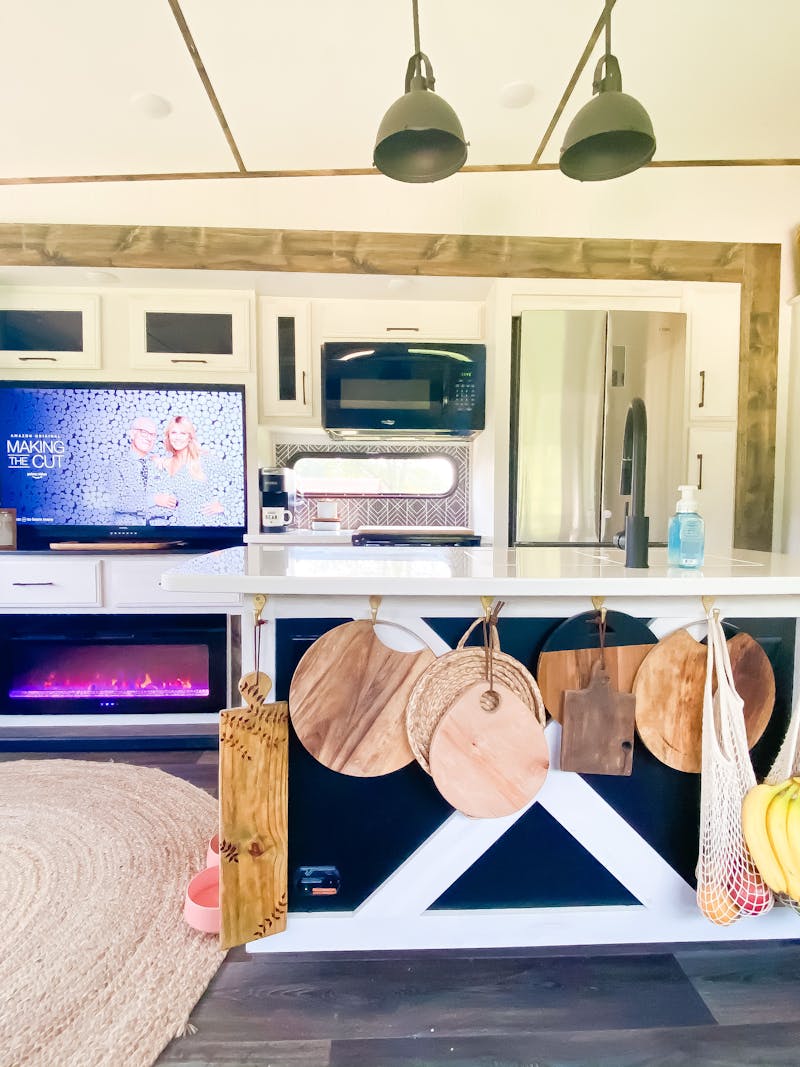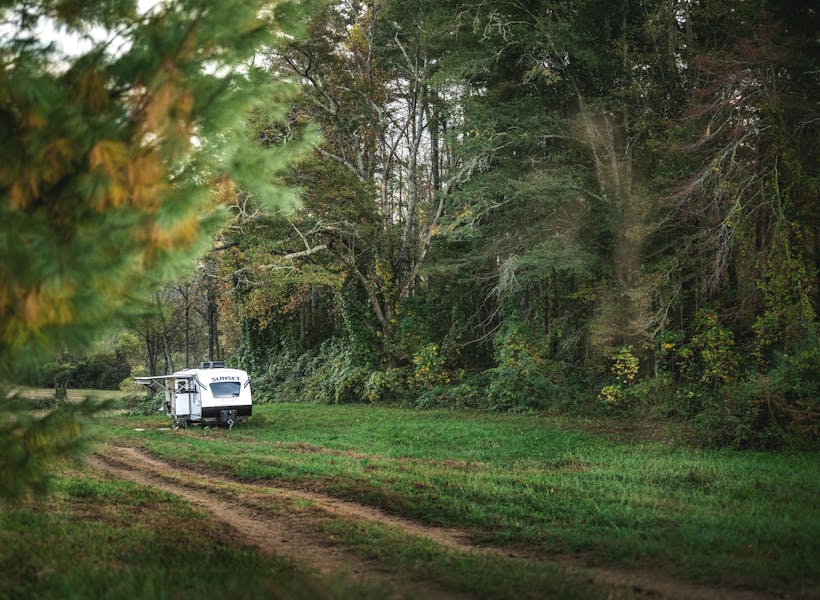Learn
How To Maximize Storage And Organization In An RV
Five tips for maximizing the storage space inside your RV, while keeping everything clean and organized.

A common concern among a lot of potential RV owners is how they will manage the small space. Not just the physical size of the RV but also the close proximity to their loved ones and travel partners. So, we decided to ask two different RVers—a young couple who travels on the weekends in their Class C, and a large family that travels long-term in their fifth wheel—how they make a small space work for them. Here’s what they had to say…
After living in Washington, D.C., for a decade, Sarah decided to buy an RV and hit the road with her husband Ben and their French bulldog Hobbes.

We’ll start by saying that choosing to buy an RV has been one of the best decisions we ever made. We toured a ton of different RV types and layouts to figure out which one could work the best for us. The layout in your RV is one of the few things you won’t be able to change, so it’s important to be selective. It was helpful to actually step inside a few different RVs so we could start to narrow down what we liked and didn’t like.
There may be some features and amenities that you and your partner disagree on, which is okay, but it’s important to be on the same page about the big things. For example, we knew we wanted an RV that had a separate bedroom with a bed that we could walk around, a table or area that we could use for work, and lots of storage. Neither of us felt super comfortable with towing or hitching, and we were planning to visit a lot of national parks, so a smaller, motorized RV was our preferred option. The layout of the Thor Motor Coach Chateau fit all of our requirements—it had a big enough bed so my husband and I could sleep peacefully, and a great table that could double as a workstation. It even came with an extra bed above the cab, which is perfect for guests and visitors.

Once we got our RV, my husband and I both knew that we would need to work from it from time to time. To help, we each established a designated work space so we wouldn’t disturb each other. One can work at the dining table and the other can take the front cab or rear bedroom. We also try to coordinate our work schedules so we both won’t be on calls or trying to download large files at the same time. Occasionally, if the weather is nice, one of us will opt to work outside or even at a nearby coffee shop.

RVing can feel like a vacation every day, but you still have to do the mundane tasks, like clean up and chores. It’s important to divvy-up the household responsibilities to match your strengths. For example, I usually handle the route planning and campground researching, while Ben handles the mechanical stuff and does the grocery shopping. Divide and conquer when you arrive at a new campsite as well—one of you can get the outside of the rig situated while the other person sets up the inside.
Communication skills become even more important when you and your loved ones share a few hundred square feet. I always try to remind myself that we are on the same team. When things go wrong (which they sometimes do), being able to laugh it off later goes a long way. Try to stay calm when dealing with an issue or conflict, and focus on how the two of you can tackle it together.

When you first move into your RV, take stock of the available storage options, and try to designate specific spaces for food, cooking supplies, clothes, and your work set up. Make it easy to get to the items that you use everyday. For stuff we need less frequently, we have labeled plastic totes stashed in our undercarriage storage. These totes house things like extra clothes, outdoor gear and games. When it comes to groceries, try to buy smaller quantities more frequently. Another tip is to declutter your RV every few months. It’s surprising how easy it is to accumulate stuff on the road, so try to regularly take inventory and get rid of anything you don’t need.

As a couple, RVing provides so many opportunities to spend quality time together. We can explore new towns, adventure through national parks and try new restaurants. But trying to check everything off our bucket list at once can feel exhausting. I’ve learned to embrace the fact that you can’t see and do it all. Plus, you can save some experiences for future visits.
Finding alone time can be tricky when traveling in an RV with your significant other. To get a little space, we like to look for opportunities to keep up with the activities that we personally enjoy. This might mean going for a long run, booking an exercise class at a nearby town or doing some volunteer work in the local community. Even just going for a walk by yourself around the campground can help. We also make a point to regularly connect with our non-RV friends and family, and we often invite them to come stay with us. Having other people that you can talk to will help take all of the focus off your partner.

It’s important that your small space feels comfortable and like a true home on wheels. Afterall, your RV should be a place that you enjoy spending time in and can relax. We’ve added throw pillows, an essential oil diffuser and some plants to really give the space a more homey look and feel. And best of all? We get to bring our dog along, which makes our home feel complete. In our experience, RVing can bring couples closer together, literally and figuratively. While moving into a small space is an adjustment, traveling and working in a RV helps you focus on what really matters. Thousands of miles later, it has been a journey we wouldn’t trade for anything.
Darren and Amanda, along with their three kids and standard poodle, have been traveling long-term in their Heartland Bighorn.

As a family of five, plus a dog, it was crucial to find an RV that best suited us—one that would give each of us our own space and still allow us to host friends and family. We also knew that moving from a large house to an RV would be an adjustment, so we wanted to make the transition as easy as possible for our kids. Our oldest daughter is entering her teenage years, so it was really important that she had her own space. Our RV has an elevated loft space that is perfect for her. She’s old enough to safely climb up, and it provides her some privacy from her two younger brothers. Our two boys are close in age, so they are more comfortable sharing a room. They took the bunk room beneath the loft, which has two individual beds so they each have their own private sleeping space. My husband and I have the main bedroom, which comes with a king-sized bed and a door we can close for privacy.

When we moved into our RV, we knew we would need to downsize and limit the possessions we brought with us. To help prioritize, we gave each child a large, plastic storage bin and let them fill it with personal items that they felt were the most important to them. For clothes, we split our wardrobes into summer and winter seasons. We fill our dressers and closets with clothes for the current season, and then use vacuum bags to store the others under our bed.
I used the same storage bin method for our kitchen and bathroom. I kept one of each type of cooking utensil, and one pot or pan of each size. Since we are a family of five, I kept our full set of flatware. We like to have guests over for dinner, so I knew we would need more than five forks and five spoons. We also tried to bring multi-purpose kitchen gadgets. We have an Airfryer, an InstantPot and a blender, all of which can be stored under our kitchen sink and can be used for a variety of reasons.

Traveling together in an RV is actually pretty similar to living together at home. Our daily schedules haven’t changed much. Only now, we have to account for travel days and our backyard is constantly changing. My husband and I still work and our kids still have their schooling, but we still find time to take vacations and have some time off. Whenever friends or family are nearby, we can leave our RV parked and go visit them or take a trip. Our kids also have daily chores, just like they did in a traditional house. Our space is smaller, so the chore list is smaller, but we’ve added age-appropriate tasks so they can help with other things, like RV set-up and take down. We also give them a weekly allowance to help them learn money management and work ethic skills.

Traveling small in an RV has made our family bond stronger. We have so much more time together, and we enjoy being with one another more. Do we still have conflicts? Of course, but these issues seem to resolve much quicker now. If someone gets upset or an argument happens, it helps to create some physical space. We’ll go for a walk or sit outside, and clear our heads for a few minutes. It’s really hard to stay mad at someone who is only ten feet away from you at all times. Being in an RV has taught us to communicate our feelings and frustrations right away, instead of retreating to another room and closing the door. You’re forced to deal with your issues and move on. I can confidently say that choosing to travel long-term in an RV has been the best decision for our family thus far.
Whether you're new to the world of RVing or you're ready to narrow your search, we're here to help you sort through it all and find the RV that's right for you. Explore RVs based off of your lifestyle and the features important to you.
